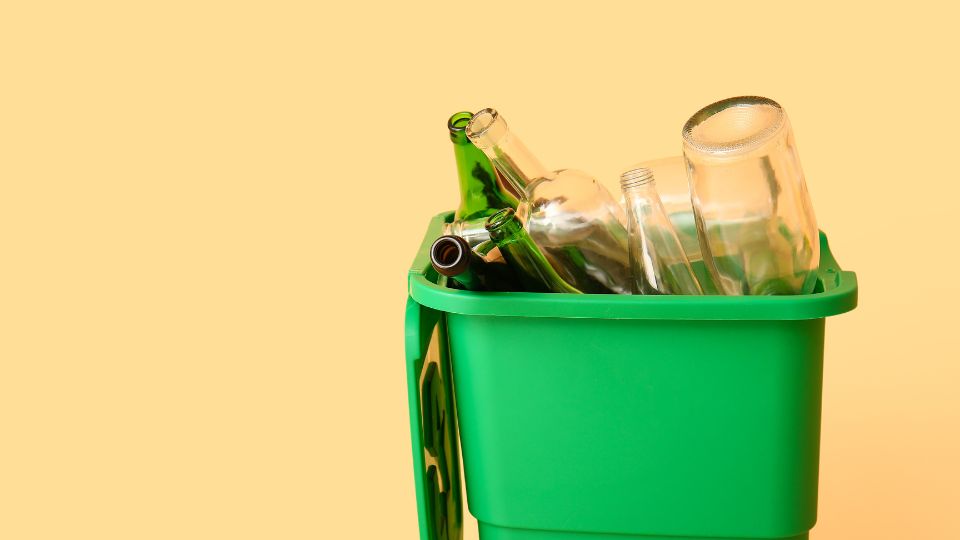
Quick summary:
- Clarify why the perception that glass is no longer recyclable in the UK is a myth, and highlight the actual challenges facing glass recycling.
- Address and correct common myths about glass waste, including the belief that glass cannot be recycled, that all glass is the same, and that recycling glass is ineffective or too expensive.
- Offer actionable advice for UK business owners on how to enhance their glass waste management practices, including proper sorting, reducing contamination, and implementing effective recycling programs.
In recent years, glass waste management has become a hot topic in the UK, particularly for businesses striving to enhance their waste management practices.
As concerns about recycling efficiency grow, it’s essential to address some common myths surrounding glass waste.
This blog aims to clarify misconceptions and provide practical insights for UK business owners looking to optimise their waste management strategies.
Table of Contents
- Why is Glass No Longer Recyclable in the UK?
- Common Myths About Glass Waste
- Tips for Enhancing Glass Waste Management
- Conclusion
Why is Glass No Longer Recyclable in the UK?
The notion that glass is no longer recyclable in the UK is a common misunderstanding. In reality, glass remains highly recyclable, but several factors have affected its recycling efficiency:
Contamination Issues: One major challenge is contamination. When glass is mixed with other waste or contaminated with food residues, it becomes difficult to process.
This contamination can lead to higher costs and inefficiencies in recycling facilities.
Economic Factors: The economics of recycling glass have been impacted by fluctuating markets.
With changes in global recycling markets and fluctuating demand for recycled glass, the financial viability of recycling glass can vary.
Technological Limitations: While the technology for glass recycling is advanced, the cost of upgrading facilities to handle mixed or contaminated glass can be prohibitive.
This has led some facilities to focus on other materials that are easier to process.
Common Myths About Glass Waste

1. Myth: Glass Can’t Be Recycled
Fact: Glass is one of the most recyclable materials available. It can be recycled indefinitely without losing quality. The real issue lies in the handling and processing of glass waste.
Properly sorted and clean glass is recyclable and should be a key part of your waste management strategy.
2. Myth: All Glass Is the Same for Recycling
Fact: Not all glass is created equal. Different types of glass—such as bottle glass, jar glass, and window glass—require different processing methods.
Mixing these types can lead to contamination and reduce the efficiency of the recycling process. Ensure your glass waste is sorted correctly to maximise recycling efficiency.
3. Myth: Recycling Glass Is Too Expensive
Fact: While there are costs associated with recycling glass, the long-term benefits outweigh the initial investment. Recycling glass reduces the need for raw materials, saves energy, and minimises landfill waste and its impact on marine life.
Investing in efficient glass recycling practices can be cost-effective over time.
4. Myth: Glass Recycling Is Ineffective
Fact: When properly managed, glass recycling is highly effective. Recycled glass can be used to create new glass containers, reducing the need for raw materials and energy consumption.
The effectiveness of recycling depends on proper waste sorting and the efficiency of local recycling facilities.
5. Myth: Glass Waste Doesn’t Affect Landfills
Fact: While glass does not decompose quickly, it still contributes to landfill bulk and can take up valuable space. In the UK 14 million glass bottles and jars are sent to landfill each year.
Proper recycling not only conserves resources but also reduces the environmental impact of glass waste.
Tips for Enhancing Glass Waste Management

Implement a Glass Recycling Program: Work with waste management companies to set up a glass recycling program tailored to your business needs. Regularly review and adjust the program to ensure its effectiveness.
Reduce Contamination: Educate employees on how to reduce contamination in glass waste. This includes rinsing out bottles and jars and avoiding mixing different types of glass.
Monitor and Improve: Regularly monitor your glass waste management practices and look for improvement opportunities. This can involve working with waste management experts to identify areas for optimisation.
Conclusion
Glass remains a valuable and highly recyclable material, effective recycling depends on proper waste management practices.
By debunking myths and focusing on proper sorting and contamination prevention, UK business owners can enhance their waste management strategies and contribute to a more sustainable future. Investing in efficient glass recycling practices benefits the environment and aligns with responsible business practices.
For more information on optimising your glass waste management, contact our team of experts today.







